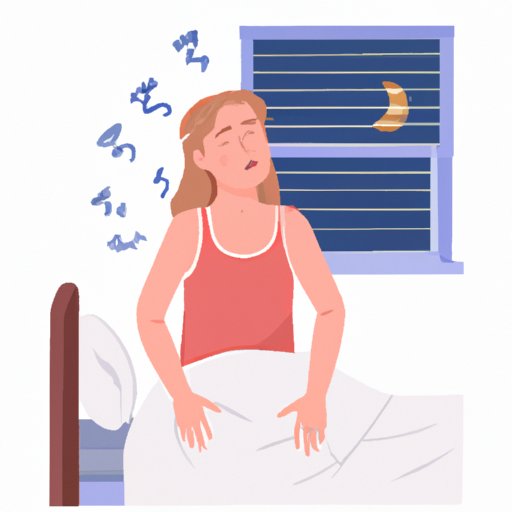
Introduction
Night sweats can be a frustrating and uncomfortable experience that can disrupt sleep and leave us feeling drained and fatigued. This condition is characterized by excessive sweating that occurs during the night, often resulting in soaked pajamas and bedding. In this article, we will explore the link between stress and night sweats and offer advice on managing both.
Exploring the Link: How Stress Can Trigger Night Sweats
To understand the link between stress and night sweats, it’s important to first define what stress is and how it affects the body. Stress is the body’s response to a challenging or threatening situation, whether real or perceived. The body responds to stress by releasing hormones, such as adrenaline and cortisol, which prepare the body for a fight or flight response.
When the body is under stress, this hormone release can disrupt the body’s natural sleep patterns and cause night sweats. Stress also causes an increase in body temperature, which can lead to sweating during sleep. In addition to causing physical symptoms, stress also affects mental health and can lead to anxiety, depression, and other mood disorders.
There are many situations that can cause stress and trigger night sweats. For example, work-related stress, financial worries, relationship problems, and major life changes such as moving or a new job can all lead to stress and subsequent night sweats.
Alleviating Symptoms: Managing Stress and Night Sweats
To manage stress and alleviate night sweats, there are several measures that can be taken. First, it’s important to identify the sources of stress and work towards resolving or reducing them. This may involve seeking support from loved ones or a mental health professional, practicing relaxation techniques such as meditation or deep breathing exercises, or engaging in regular exercise or other stress-relieving activities.
To manage night sweats, it’s important to keep the bedroom cool and maintain a comfortable temperature. Avoiding alcohol and spicy foods before bed can also help reduce the likelihood of night sweats. Choosing lightweight bedding and wearing breathable, moisture-wicking pajamas can also help prevent night sweats.
In some cases, night sweats may be a symptom of an underlying medical condition, and seeking medical help may be necessary. For chronic or severe night sweats, a physician may suggest hormone therapy or other medications to manage symptoms.
Personal Essay: My Experience with Night Sweats and Stress
As someone who has struggled with both stress and night sweats, I understand how inconvenient and uncomfortable this condition can be. I first began noticing night sweats during periods of high stress, such as exams or job interviews. The sweating would make it difficult to maintain a comfortable sleep environment, leading to disrupted sleep and fatigue.
Through trial and error, I discovered several methods that helped alleviate both stress and night sweats. Regular exercise, meditation, and therapy all helped me manage stress more effectively. I also found that keeping my bedroom cool and comfortable helped reduce the frequency and intensity of night sweats.
While everyone’s experience with night sweats and stress may be different, I encourage readers to try different methods of managing symptoms and finding what works best for them. Don’t be afraid to reach out for help or seek medical advice if needed.
The Science Behind Night Sweats and Stress
Research has found a clear link between stress and night sweats, with several studies demonstrating that stress can lead to increased body temperature and night sweats. In addition to stress, hormonal imbalances, medications, and certain medical conditions can also cause night sweats.
Medical professionals advise that anyone experiencing night sweats on a regular basis should consult with a physician to rule out any underlying medical conditions. In some cases, hormone therapy or other medications may be necessary to manage symptoms.
Differentiating between Causes of Night Sweats
It’s important to differentiate between night sweats caused by stress and those caused by other potential factors, such as hormonal imbalances or sleep apnea. Hormonal imbalances, for example, can occur in women during menopause and can cause severe night sweats as a result of changing hormone levels. Sleep apnea, on the other hand, can cause sweating during sleep due to interrupted breathing patterns.
To determine the root cause of night sweats, it’s always best to consult with a healthcare professional. In some cases, blood tests or other diagnostic tools may be necessary to determine the underlying cause.

Historical and Cultural Context for Night Sweats
Night sweats have been documented across cultures and throughout history, with treatments ranging from herbs and teas to acupuncture and prayer. In traditional Chinese medicine, for example, night sweats are often attributed to imbalances in the body’s yin and yang, and treatments may focus on restoring balance through acupuncture or herbal remedies.
While traditional remedies may offer temporary relief for night sweats, it’s important to consider the underlying causes and seek medical advice as needed.
Managing Stress for Overall Health
Reducing stress is not only important for managing night sweats, it’s also critical for overall health and wellness. Chronic stress has been linked to a variety of health problems, including cardiovascular disease, diabetes, and mental health disorders.
To manage stress in everyday life, it’s important to prioritize self-care, maintain social connections, and adjust workloads as needed. Incorporating stress-relieving activities such as meditation, exercise, or artistic hobbies can also help reduce stress levels.
Conclusion
Night sweats can be a challenging and disruptive condition, but understanding the link between stress and night sweats can help manage symptoms more effectively. By identifying sources of stress, practicing stress-reducing techniques, and making lifestyle adjustments such as keeping the bedroom cool, you can reduce the frequency and intensity of night sweats. Remember, seeking medical help may be necessary for chronic or severe night sweats, and it’s always important to prioritize self-care and mental health for overall wellness.




